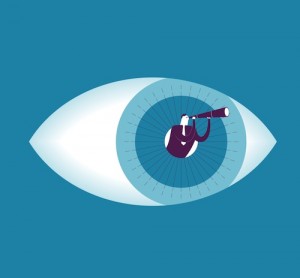
by EyeLASIK | Nov 5, 2014 | better vision, eye health
Be Proactive!
It’s easy to overlook eye care when you’re seeing well and have no irritation. However, even then, it is important to take care of your eyes! Oftentimes, when you wait until you notice a problem, it may be too late. Take a look at these easy ways to be proactive about your eye health!

Be proactive about your eye health!
- Visit your eye doctor-Get regular exams and make sure your eye doctor knows your accurate health history. Adults should have yearly eye exams and children should first see the eye doctor between the ages of 6 and 12 months. It’s important to detect visual problems early to avoid learning problems down the road.
- Replace Contact Case-If you wear contacts, be sure to replace your contact lens case every two to three months. This is a primary reason for complications. Often, contact cases are kept in humid bathrooms, which is a breeding ground for bacteria. Replace your case often and keep it in a clean , dry place. Take caution to entirely empty the case of all solution and thoroughly rinse and dry the case before putting it away.
- Caffeine Intake-Good news, two servings of caffeine a day can protect against dry eyes. However, more than 2 servings can deplete your tear film and dry out your eyes, leading to irritation. So, consume caffeine, but not too much!
- 20-20-20-Most people work in front of a computer all day. It is important to give your eyes a break! Remember the 20-20-20 rule. Every 20 minutes, look 20 feet away for at least 20 seconds. This breaks the eyes’ constant strain and helps refresh eyes by increased blinking. When using a computer, try to stay an arm’s distance away to avoid eye strain and dry eyes.
- Eat Your Veggies-Eating healthy foods isn’t JUST good for your health, it’s good for your eyes too! Don’t discount the power of fruits and veggies in regards to eye health. Dark leafy greens are rich in lutein, which protects against macular degeneration. Foods rich in omega-3s, such as fish and walnuts have been known to reduce inflammation in the blood vessels of the eye.
Taking Care Of Your Eyes Is Important!
Use these 5 tips daily to maintain and improve eye health and always remember the importance of taking care of your eyes. Are you interested in LASIK surgery for clear, crisp vision? Request a free consultation HERE and see if it’s right for you! You can also subscribe to our newsletter and receive all the latest news and promotions from Eye LASIK Midland!

by EyeLASIK | Oct 28, 2014 | Eye LASIK
The eyes are amazing…scary amazing! Here are 10 eye facts that will blow your mind, and possibly even scare you!

Check out these eye facts…but beware!
- You blink your eyes about 12 times every minute, on average. That’s about 4,200,000 per year!
- The majority of vision problems, approximately 80%, are avoidable or even curable.
- The muscles that control your eyes are the most active out of ALL the muscles in your body!
- Some people are born with two differently colored eyes, a condition known as heterochromia.
- Eyesight requires about half of the brain.
- It’s impossible to sneeze with your eyes open.
- The human eyeball weighs about 28 grams.
- All babies are color blind at birth.
- The human eye can distinguish 500 shades of gray.
- The human eye can see the light of a candle up to 14 miles away, under the right conditions.
Who knew how complex eyes were? Be sure you’re treating your eyes with the best care possible. Check out our blog section for more eye care tips & tricks and other interesting eye facts! If you have another eye question, or would like to contact us, you can do so here.

by EyeLASIK | Oct 23, 2014 | eye health
Mystery Myths…
There are so many wives’ tales about your eyes! From eating carrots to sitting too close to a TV screen, how do you know which ones to believe? Let’s bust some eye myths and establish the best ways to protect vision and maintain eye health.
Don’t cross your eyes! They’ll get stuck!
Myth! Contrary to popular belief, your eyes will not stay crossed if cross them. If you notice your child is crossing one eye constantly, schedule an appointment with their eye doctor.
Eating carrots can improve vision.
Myth…kind of. Carrots are rich in Vitamin A, which IS essential to sight, but not necessarily the only food that benefits eye health. A well-balanced diet, full of fruits and vegetables, can provide the Vitamin A necessary for good vision.

Eye Myths Debunked!
Screen use damages eyes.
Myth! According to the American Academy of Ophthalmology, screen use won’t harm the eyes. However, using a computer for long periods of time can lead to eyestrain (eyes blink less than normal when looking at a screen and can dry out). Take a break every half hour or so to rest your eyes and moisturize them.
The eye is full size at birth.
Myth! Eyes continue to grow as your body grows. This growth accounts for refractive (glasses) changes that occur during childhood.
Only males can be color-blind.
Myth! While males do have more color-blindness than females (8% of males, less than 1% females), both males and females can be color-blind.
Poor eyesight is genetic.
Ehhh, this one is sometimes true. If your parents require glasses, or if they have an eye condition, they may pass the trait down to you.
Two blue-eyed parents can’t have a child with brown eyes.
Myth! Two blue-eyed parents CAN have a child with brown eyes, even though it is very rare. Likewise, two brown-eyed parents CAN have a child with blue eyes.
Debunked!
There you have it! Eye myths debunked! Now you have a better idea of how to protect and maintain good vision. If you’re interested in more information on obtaining better vision, you may be an excellent candidate for LASIK surgery. You can request a free consultation HERE! If you would like more eye health tips & tricks, subscribe to our newsletter and be entered to win a pair of Tory Burch sunglasses!

by EyeLASIK | Oct 15, 2014 | Uncategorized
Eye Injury Prevention Month
October is eye injury prevention month. Protecting your eyes is one of the most basic things you can do to prevent eye injuries. But when eye injuries do happen, how do you recognize them and what do you do? Find out everything you need to know about eye injuries.
Wearing protective eye gear can prevent up to 90% of all eye injuries. Most eye injuries happen around the house, so wear eye protection whenever you can (mowing the lawn, working with tools, sun exposure, etc.) Eye protection is the best way to prevent an eye injury.
However, if an eye injury does occur, it is very important to see an ophthalmologist immediately, even if you think the injury is minor. Do NOT rub your eye or try to remove something you may think is causing the injury. Do not rinse your eye unless you may be suffering from a chemical burn.

Find out everything you need to know about eye injuries!
There are several ways to know if you or someone you know is suffering from an eye injury:
- Unusual pupil size
- One eye is moving slower than the other
- Obvious trouble seeing and/or irritation
- The eye is more protruded than the other
- Blood in the eye
Among other things, eye injuries can cause blindness, so they should be treated seriously and with extreme caution. Do not treat an eye injury yourself. More than likely, you will only make the problem worse. Call your ophthalmologist’s office for advice or to schedule a time to see a professional.
At Eye LASIK Midland, we value vision and work to protect and improve your vision. If you would like a free consultation to discuss a LASIK procedure, request one HERE. If you would like to stay up to date on all the latest eye care tips, Eye LASIK news and promotions, subscribe to our newsletter or take a look at our other blogs.

by EyeLASIK | Oct 8, 2014 | better vision, eye health
Can You Prevent The Decline Of Vision?
With aging bodies, come aging eyes. What can you do to prevent the decline of vision? Surprisingly, proper eye care for people over 50 (screening, diagnosis and treatment) can help to delay and even prevent vision decline.
Over half of baby boomers will develop an age-related eye disease. However, a recent study suggests more people are interested losing extra weight or eliminating back pain. Unfortunately, people don’t realize what’s at stake when it comes to their vision, assuming vision decline is something that is inevitable and expected. It doesn’t have to be! Appropriate Eye care for people over 50 can prevent the “inevitable” affects aging has on the eye.
Of course, aging and the affect it has on eyes is dependent on various factors (lifestyle, exposure, genetics). However, there are things you can do to reduce this affect.
Reduce The Effects Of Aging
- First, listen to your body. If something seems wrong or if you begin to question your vision, talk to a doctor. Always follow your instinct if something seems amiss.
- Have a baseline eye exam at age 40 to assess your eye health and receive personalized eye care tips, based on family history and lifestyle. After that, you should visit your eye doctor for a check up at least once a year, perhaps more often if recommended by your doctor.
- If you have diabetes, high blood pressure, or a family history of eye diseases, you should visit your eye care provider more regularly. There are probably drops or other medication you should be taking. Be sure to remain consistent and diligent with these medications, to treat and prevent any eye diseases that would lead to vision decline.
- Always wear some type of eye protection when going outside. Wearing special UV protection sunglasses and contacts protect the eyes more directly by blocking the effects of damaging rays, while a hat can help to shade your eyes. Avoid sun exposure between the hours of 10 am and 2 pm, as those are the most dangerous.
- There are so many links to good eye health and proper nutrition. Make healthy choices, with a diet hight in antioxidants from fruits and vegetables, to prevent the decline of vision. Ask your doctor which eye care supplement may be right for you. There may be a specific vitamin to promote eye care for people over 50, which should sometimes be recommended on a individual basis.
We’re Here To Help!
Eye care for people over 50 does not have to hard, if done the right way, and can make all the difference. Use these tips today and begin preventing vision decline! If you would like more eye health information, take a look at the rest of our blogs. If you have another question, please feel free to contact us HERE. We’re here to help!
Have you entered for a chance to win a pair of FREE Tory Burch sunglasses?! Just subscribe to our newsletter and enter into the drawing that will be held at the end of October!

Page 23 of 31« First«...10...2122232425...30...»Last »






